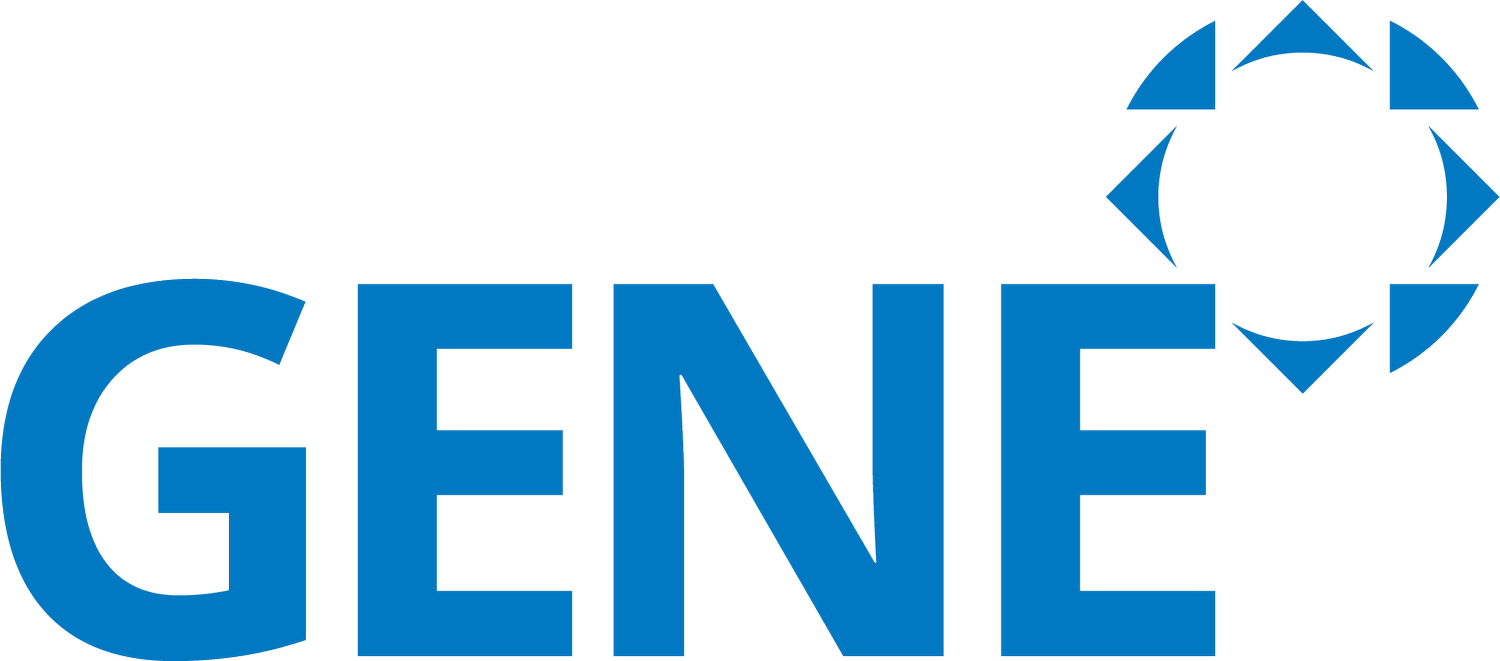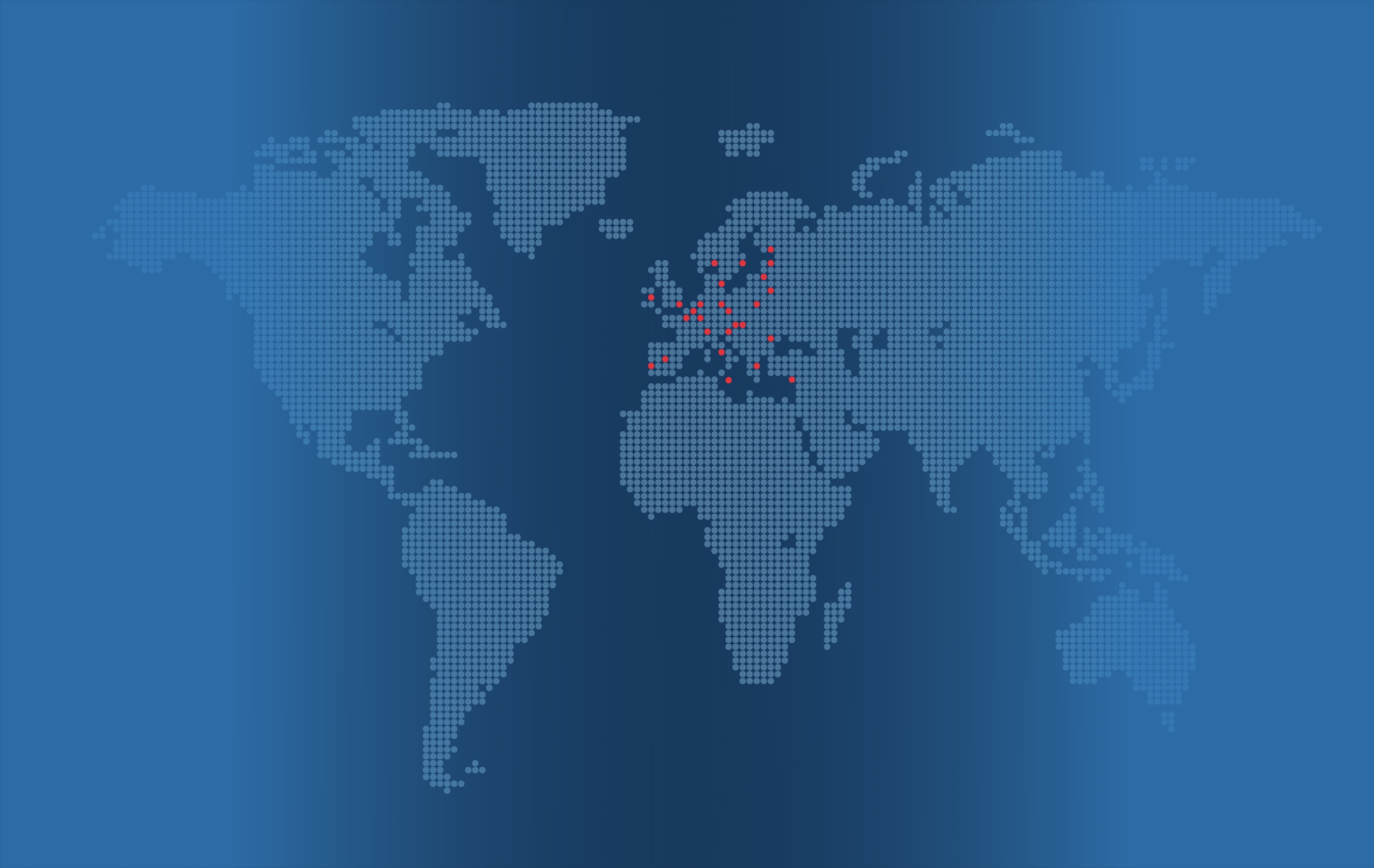
Networking Ministries and Agencies in Global Education.
Global Education Network Europe (GENE) is the European network of Ministries and Agencies with national responsibility for policymaking, funding and support in the field of Global Education.
Started in 2001 with 6 national structures from 6 countries, GENE now has grown to include over 50 Ministries, Agencies and other national bodies, from over 25 countries.
Latest News
-

International webinar on Education for Development & Democracy
GENE was pleased to take part in the webinar "La Educación para el Desarrollo: un aporte a la profundización de la Democracia / Education for Development: A Contribution to the Deepening of Democracy" on 4 December 2025. The 90-minute session brought together partners from across Europe and Ibero-America for dialogue, reflection, and shared learning.
The webinar addressed how, in times marked by misinformation, polarisation, shrinking civic space, and rising global challenges, Education for Development and Global Education offer essential pathways to strengthen democratic values, participation, and cooperation. The organisers and partners included: Ciudadanía Global para el Desarrollo Sostenible (CGpDS), GENE, La Liga Iberoamericana, Consejo de Educación Popular de América Latina y el Caribe (CEAAL), Secretaría General Iberoamericana (SEGIB), IIEP-UNESCO Latin America and the Caribbean, and OEI - Organización de Estados Iberoamericanos. The event provided a valuable opportunity to connect with colleagues, educators, policymakers, and organisations committed to strengthening democracy through inclusive, participatory, and transformative Global Education. Read more.
-

GENE contributes to Global Education reflections at CIDAC–Amora School event
The event organised by CIDAC - Centro De Intervenção Para O Desenvolvimento Amílcar Cabral and Amora Secondary School on 28 November 2025 offered an inspiring space for reflection on global education and on the intersections between public policy and school transformation. The programme included talks, working groups, discussions and project showcases by students, and explored the policy landscape, the collaborative work between civil society organisations and schools, and the ways these processes shape everyday school life. The visit to Amora Secondary School made it possible to see in practice what a whole-school approach to citizenship and development education looks like, to observe the results of the long-standing partnership with CIDAC, and to witness the impact of this approach on school leadership, teachers and students.
GENE’s contribution focused on the effects of public policy on global education. The central ideas were to show how global education has moved from the margins to the centre of education systems over the past decades, how strong policy frameworks such as the Dublin Declaration reinforce global education from national policy to curriculum and whole-school approaches, and how this commitment to transformative education is being strengthened in a context marked by growing threats to democracy. Learn more from the event programme and newsletter preview.
-

GENE Joins Dialogue on the Role of NGOs in the Future of the World
GENE’s Executive Director, Liam Wegimont, participated in the event “Between Crises and Hope: The Role of NGOs in the Future of the World” in Lisbon on 17 November. Hosted by the Portuguese Platform of NGOs (Plataforma Portuguesa das ONGD), the event convened leading voices from civil society and international cooperation.
The dialogue addressed the critical role of non-governmental organisations in an era defined by overlapping global challenges, including democratic backsliding, the climate emergency, and the shrinking of civic space.
Liam Wegimont contributed GENE's perspective on the transformative power of Global Citizenship Education, the vital importance of cooperation between civil society and government, and the emerging spaces for hope and innovation.
The event also marked and celebrated the 40th anniversary of the Portuguese Platform of NGOs, a key actor in promoting solidarity, justice, and human rights. We were honoured to take part in this essential conversation. For more information, visit the event page.
-
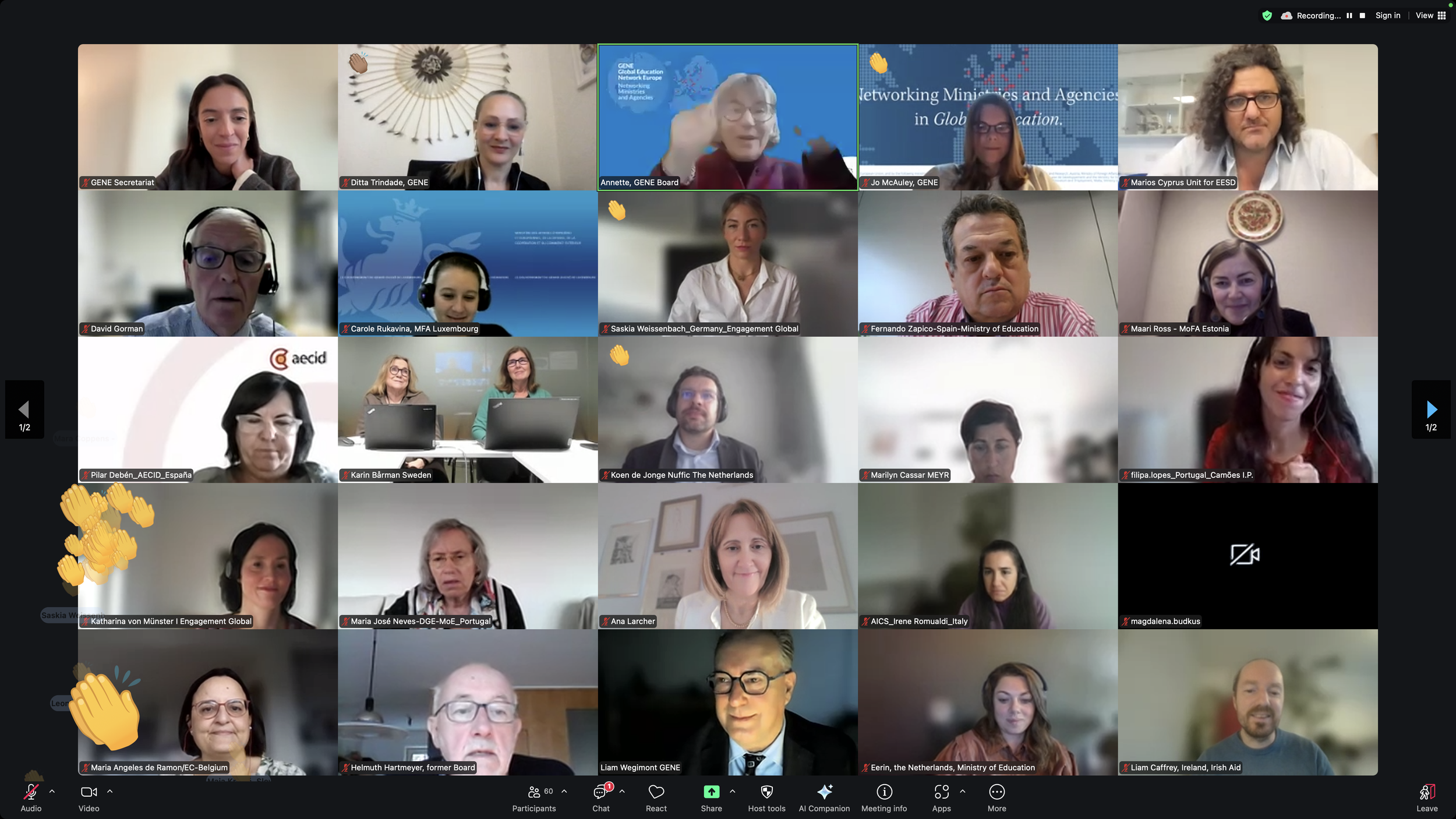
GENE Roundtable 53: Global Education – Crucial for the Future
Over two days (23-24 October 2025), GENE Roundtable 53 brought together over 60 participants from national ministries and agencies to explore how Global Education strengthens peace, democracy, and sustainability — especially in times of global uncertainty. For the first time, representatives from Ukraine joined as observers. GENE Chair Annette Scheunpflug welcomed their participation, reflecting GENE’s commitment to inclusive dialogue and international solidarity.
The roundtable highlighted the crucial role of policymakers in advancing global education, with contributions from the European Commission and national ministries, emphasising that it must remain central to Global Europe, international cooperation, and policymaking. Erica Gerretsen, Director at DG INTPA, European Commission, underlined the EU’s ongoing commitment through initiatives such as the Global Gateway and Youth Action Plan, framing the discussion around partnership, sustainability, and global citizenship.
Member states also shared promising developments: Germany announced a new curriculum framework for ESD, Portugal announced whole-of-government approval for the National Strategy for Development Education, and several countries highlighted initiatives advancing global education in various sectors.
The roundtable reinforced the importance of continuing dialogue with policymakers to ensure that Global Education remains visible, supported, and embedded at the heart of European and global policy. Read more about past GENE Roundtables here.
-

New Publication: GENE Global Education Youth Awards 2024
This publication presents the GENE Global Education Youth Award 2024 focused on quality and good practice of youth work in Global Education across Europe and gives recognition to the awarded initiatives. In line with the Dublin Declaration on Global Education to 2050, GENE seeks to highlight Global Education that promotes positive change, enabling young people to reflect critically on the world and their place in it; to open their eyes, hearts and minds to the reality of the world at local and global level; and empower them to understand, imagine, hope and act to bring about a work of social and climate justice, peace, solidarity, equity and equality, planetary sustainability and international understanding.
GENE highly appreciates the involvement of the ministries and agencies and all applied organisations in the peer learning process of this 5th edition. We hope that this publication will also enhance policy learning across borders so that learning from quality Global Education initiatives might be multiplied, and the discussion around quality in Global Education increased.
GENE Global Education Youth Award 2024, as well as the previous four GENE Awards editions, were made possible through GENE’s funders: The European Commission and funding ministries and agencies. Download the publication here.
-
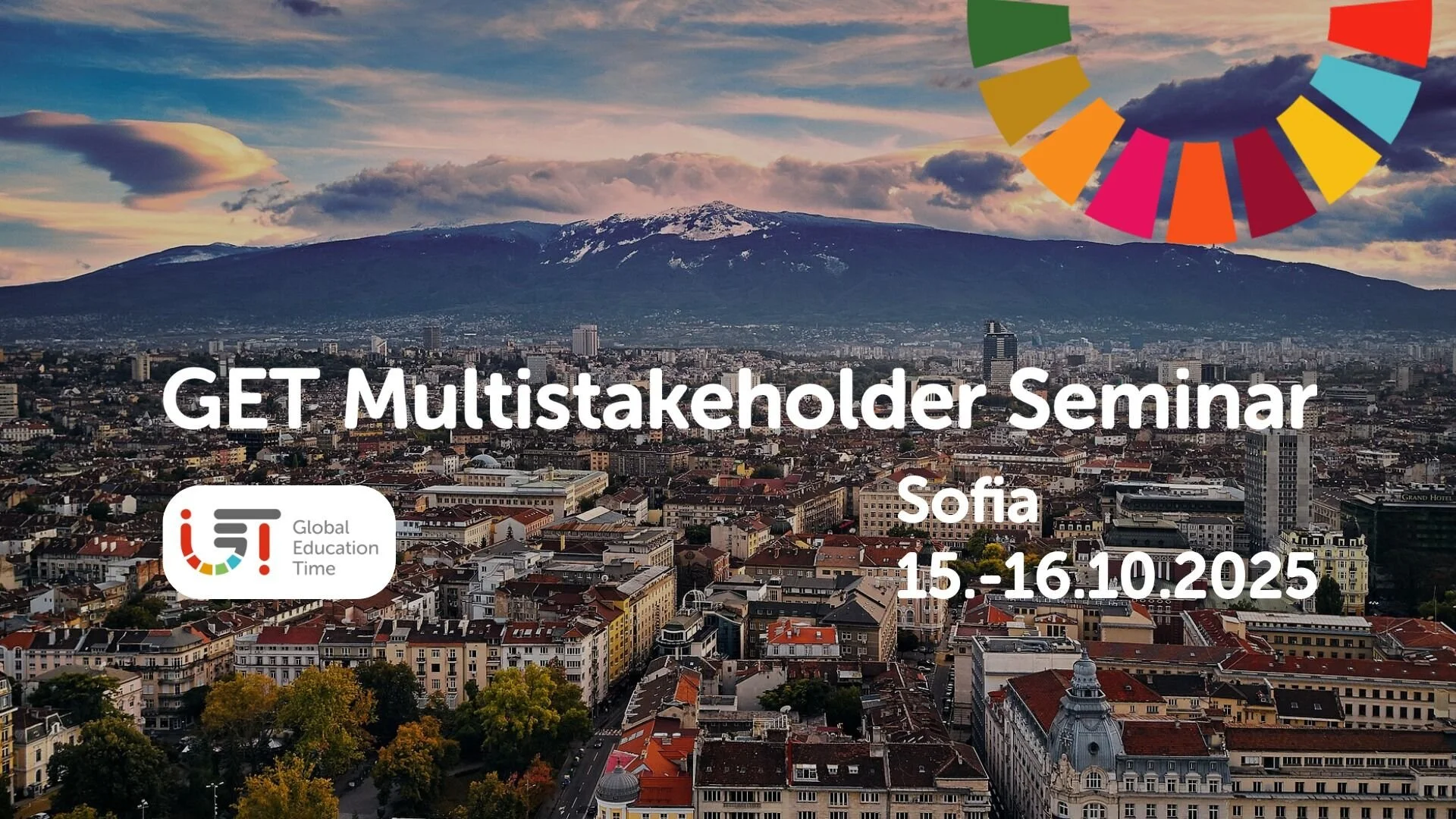
GENE at the GET Multistakeholder Seminar
The GET Multistakeholder Seminar – “It's Global Education Time: sharing GCE policy, research and practice” took place on 15–16 October 2025 in Sofia, Bulgaria, bringing together policymakers, researchers, teacher educators and civil society actors to discuss how Global Citizenship Education GCE is reflected in policy and practice across Europe. Organised by the Alliance for Regional and Civil Initiatives (ARCI), Bulgaria, and the Center for International Services and Programs (CISP) as part of the GET - It's Global Education Time project, the seminar gathered participants from across the partner countries, including representatives from the Ministry of Education and Science of Bulgaria, the Ministry of Education, Sports and Youth of Cyprus, the Ministry of Education of Greece, and the Ministry of Education of Portugal.
A key highlight was the presentation of national results of the GET studies by La Salete Coelho and Mella Cusack — a concise snapshot of the extent to which GCE is present in the policies and practices of public institutions in the eight European countries participating in the GET project. Explore the research here.
Ditta Trindade Dolejsiova, Head of Support & Innovation at GENE, contributed as a keynote speaker, addressing the role of education in advancing global citizenship. She underlined the importance of connecting policy, research, and practice; of empowering educators as facilitators of critical and hopeful learning; and of working collectively to ensure that Global Education reaches all learners.
-

ANGEL Conference 2025 successfully held in Berlin
The Academic Network on Global Education and Learning (ANGEL) Conference 2025 took place at the Humboldt Forum in Berlin from June 4-6. Themed "Research in Global Education and Learning: For Democracy, Peace, Human Rights, Sustainability, and Global Social Justice," the conference underscored the vital role of research in shaping policies and practices in global education. Throughout the event, attendees engaged in discussions on pressing topics, including the role of education in strengthening democratic values, promoting peace and humanitarian efforts, fostering sustainable practices and planetary citizenship, examining social equity, and addressing decolonisation in education. The conference was organised by GENE in partnership with the German Federal Ministry for Economic Cooperation and Development (BMZ), Engagement Global, Bamberg University, and IOE - UCL's Faculty of Education and Society, with hosting support from the Humboldt Forum. It was financially backed by BMZ and the European Union. Read more.
-

GENE and BeGlobal invite organisations to take part in a research initiative
This initiative focuses on identifying and reflecting on practices that promote inclusivity in Global Citizenship Education (GCE) in Belgium. The ‘Leave No One Behind’ principle aims to make GCE accessible to everyone by:
- Reaching under-represented groups
- Addressing discrimination and exclusion
- Engaging with diverse social groups
- Expanding beyond urban centers
- Including all education levels
How to participate? Register here and take part in our survey. Read more. -

Launch of the Latvian Peer Review Report
The launch of the Latvian Peer Review took place on the opening day of GENE Roundtable 52 on 27 March in Bratislava, Slovakia. This National Report contains the findings from the Peer Review of Global Education in Latvia that took place in late 2023. It provides an overview of Global Education in the country and includes observations and recommendations intended to assist Latvian Global Education actors to further improve and increase provision in the country, with a particular emphasis on Global Education in the context of Latvia’s new curriculum. We extend our gratitude to our core partner for the process, the Latvian Ministry of Education and Science, and to Latvian stakeholders who engaged with the process and shared their knowledge and expertise. Download the report here.
-

Starting the Peer Review of Global Education in Germany
During the last week of February, amidst a very busy time for German colleagues in the immediate aftermath of the elections, GENE and the Federal Ministry for Economic Cooperation and Development (BMZ) signed a Memorandum of Understanding to mark the start of the Peer Review of Global Education in Germany. With many thanks to our core partner BMZ for hosting and to members of the Reference Group for the review for joining us, the Secretariat visit to Berlin marked a positive start to what promises to be a very interesting and complex process. With Global Education already a strategic priority in Germany, there is excellent potential for improving and increasing Global Education. We will be back in Berlin in the autumn for the international peer review team visit and look forward to learning with and from Germany throughout the process. Read more about GENE Peer Reviews here.
-

Overview of Global Education in European Youth Policies
This resource provides policymakers, youth workers, educators, and stakeholders with a comprehensive overview of Global Education within European and national youth policies and youth work practice. Emerging from a consultative process with youth organisations that preceded the Dublin Declaration on Global Education to 2050, this publication highlights the intersection of youth policy and Global Education policy; and how they strengthen each other.
With insights gathered from youth engagement and research, the publication highlights quality Global Education practices in the youth field, showcases exemplary practices across Europe, and emphasises the need for coherent policies that empower the youth sector. This publication will be useful for those involved in policy development, youth work, and education, as well as anyone interested in understanding the vital role of young people in shaping a better world.. Download the publication here.
-

Meet our Global Education Youth Awardees 2024
Through the 2024 Global Education Youth Award, GENE highlighted quality Global Education youth initiatives, providing them with recognition to inspire others and share these exemplary youth practices with various stakeholders in Global Education, the policymakers and the broader public across Europe. 14 initiatives have been awarded out of 41 eligible submissions. 5 organisations received €5000 each, and 9 organisations received €3000 each. Altogether GENE awarded €53.000 to 14 organisations. The 5th round of GENE Global Education Award was dedicated to Global Education youth work and was opened to youth-led and youth service organisations that were inspired by the Dublin Declaration on Global Education to 2050. Submitted initiatives involved a wide range of activities, methodologies and Global Education themes, such as climate change issues, social justice, solidarity, human rights, active citizenship, inclusion, dealing with fake news, digital tools, mental health, health inequalities, prevention of violence and inter-generational dialogue. Read more.
-

HAND International Conference "Shaping Tomorrow through Global Education"
Discussions at the international conference, "Shaping Tomorrow through Global Education" (28 November 2024) centered on the 2022 Dublin Declaration on Global Education (GE2050), focusing on government and civil society collaboration, emerging topics, innovative methodologies in Global Education, educator training, and funding opportunities at various levels. Gathering policymakers, civil society organisations, youth representatives, and experts in Global Education, this conference provided a platform to explore best practices and research findings related to the implementation of national and European strategies. The conference was organised by HAND, the International Civilian Association for Humanitarian and Development, in partnership with GENE, the North-South Centre of the Council of Europe and Concord Europe. Read more.
-
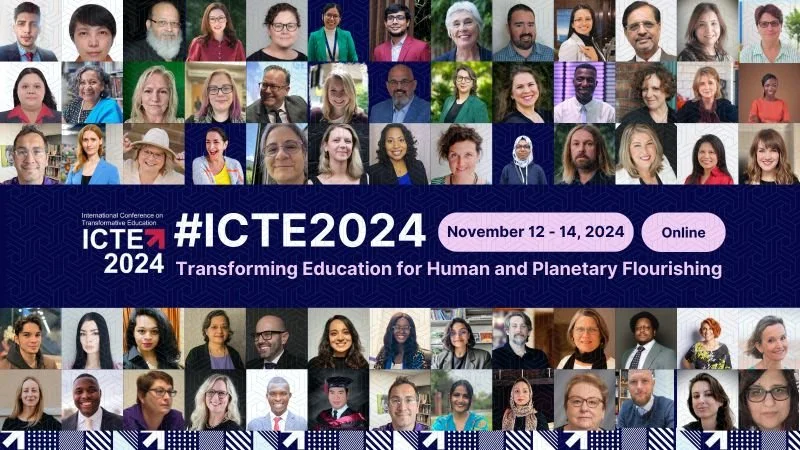
International Conference on Transformative Education 2024
On 12-14 November 2024, GENE Executive Director Liam Wegimont delivered the keynote address at the International Conference on Transformative Education for Human and Planetary Flourishing, organized by the Global Citizenship Foundation.
Mr Wegimont's presentation centered on the critical question: “How can we transform education to enhance human flourishing for people and the planet?” The conference successfully brought together over 1,000 education leaders, policymakers, and practitioners from more than 30 countries to explore the role of transformative education in addressing global challenges. The discussions highlighted how education can empower learners to engage with pressing issues, fostering respect for human rights, justice, and sustainability. In the wake of the COVID-19 pandemic, the need to rethink educational practices to ensure equity, quality, and relevance for all students has never been more essential. Read more.
-
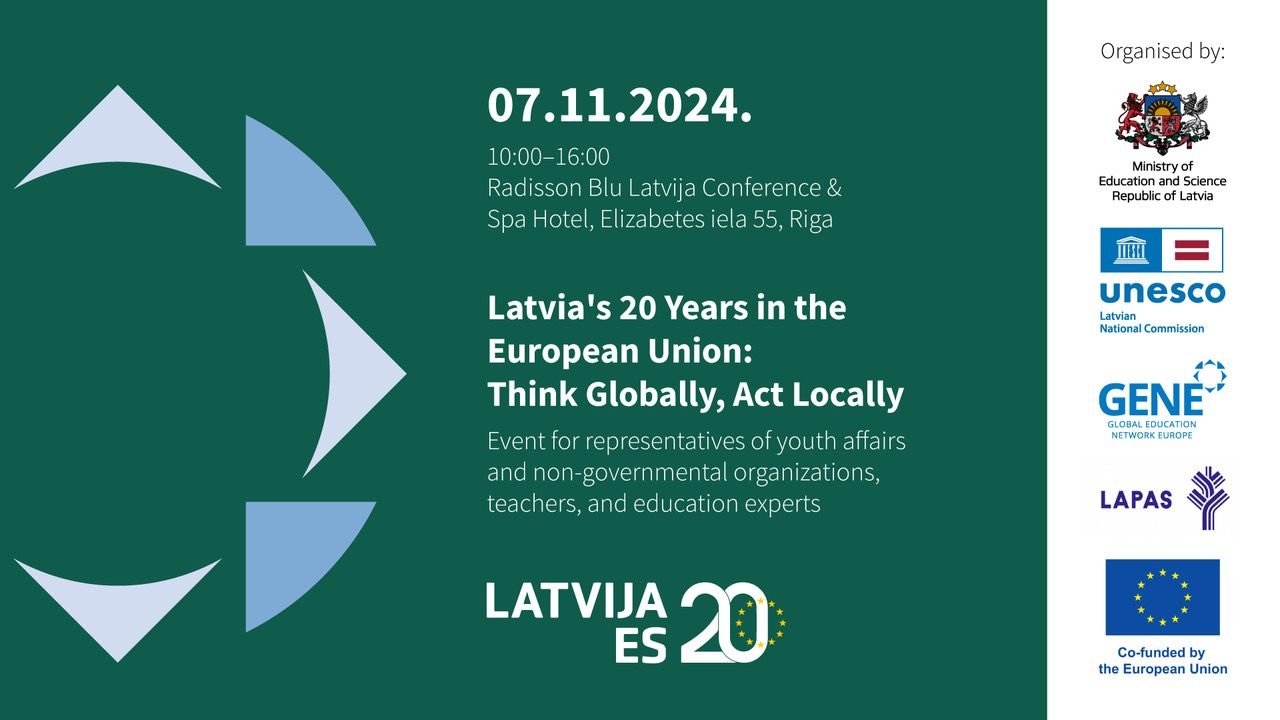
Launching the Latvian GENE Peer Review for Global Education
We are delighted to share that our Latvian colleagues have decided to emphasise, as part of their celebration of 20 years of EU membership, the role of Global Education – and to launch the Latvian GENE Peer Review in the context of this celebration.
The event took place on 7 November and is entitled “Latvia’s 20 years in the European Union: Think Globally, Act Locally”.
The event aimed to highlight the significance of Latvia's membership in the EU focusing on the role of global education, civic engagement, sustainable development, and intercultural dialogue—motivating young people to actively participate in society and brought together youth, NGO representatives, educators, and education experts to discuss the current challenges in education. Learn more about GENE Peer Reviews here.
-

2-Year Anniversary of the Dublin Declaration
Two years ago today, GENE convened and Ireland hosted the Dublin Congress on Global Education to 2050. The Congress brought together Member States, stakeholders and other international organisations for the adoption of the European Declaration on Global Education in Europe to 2050 – the Dublin Declaration. The Declaration drafting was chaired by Ireland and co-chaired by Luxembourg. Since then, we have witnessed significant progress and achievements in the field of Global Education – needed now more than ever. On this second anniversary of the Dublin Declaration, we celebrate all those who contributed to the development of the Dublin Declaration, and those – teachers, youth workers, vocational educators, community activists, curriculum developers, teacher educators, school inspectors, civil society organisations, local authorities, and policymakers from Ministries and Agencies across Europe, working to translate the vision of the Dublin Declaration into a reality. Watch this summary of what has been achieved since the adoption of the declaration and hear from those involved in the Declaration drafting process in our video with testimonials.
-
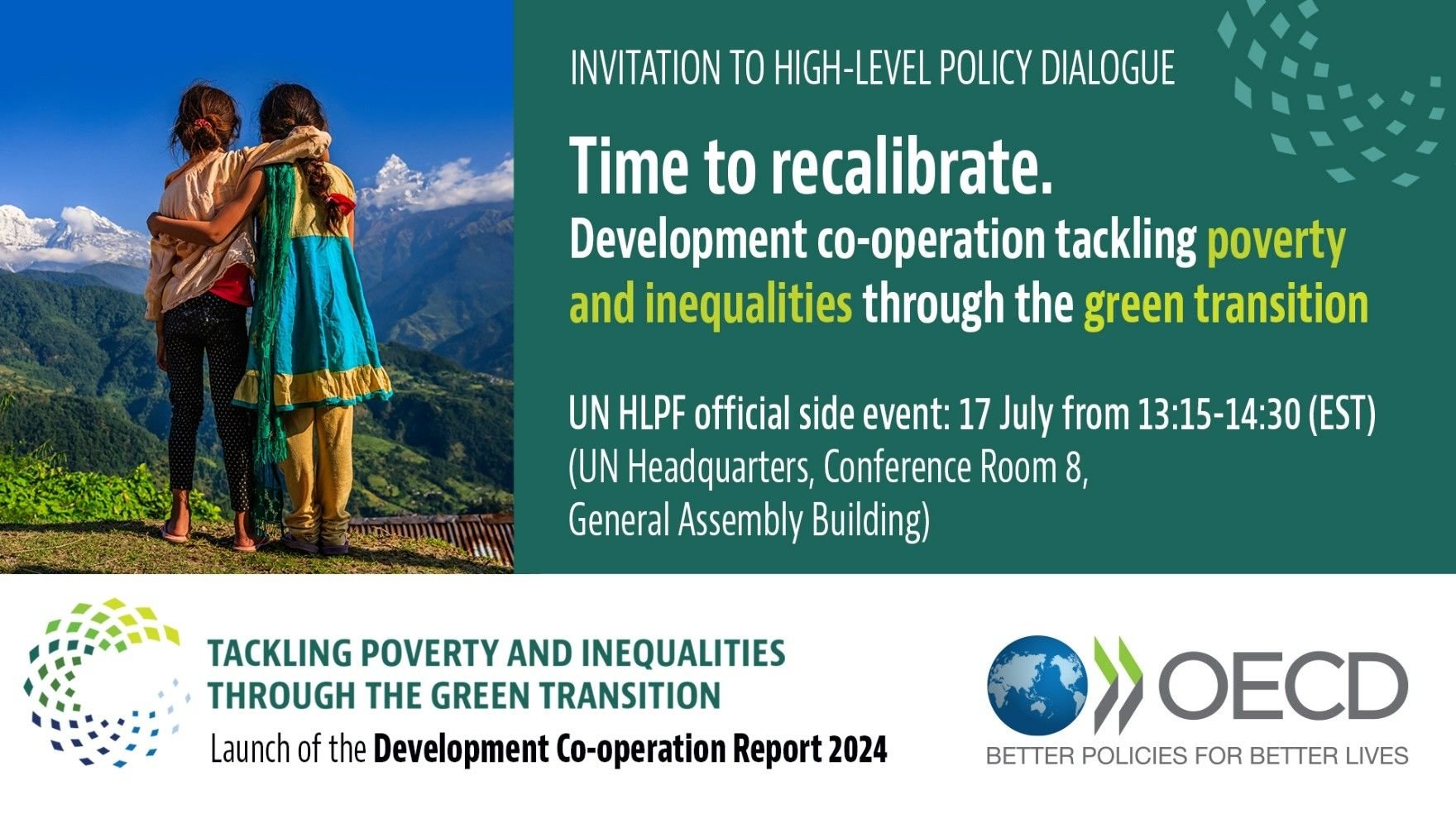
GENE contributes to the OECD Development Co-operation Report 2024
Launched on 17 July at the UN High-level Political Forum in New York, the report focuses on tackling global poverty, inequality and a just green transition. GENE has been glad to contribute to the report in a chapter focused on public opinion research, public support, public engagement and the need for global education. Read GENE's chapter here (full report here).
Public support for poverty eradication, global social justice and a just green transition remains high; but gaps in information and misinformation can sully public support. Growing movements in Global Education - in OECD countries and globally - with decades of experience; can provide the antidote and bolster critical public engagement with issues of global justice. You can watch the report launch here.
-

New publication: "Global Education in Europe: National Histories"
The evolution of Global Education in Europe is chronicled in the newly released book "Global Education in Europe: National Histories". While research in Global Education has been flourishing in recent years, including through networks like ANGEL - the Academic Network on Global Education & Learning, publications such as the database GEL - Global Education and Learning and the GENE-EERA partnership, there is little research on the history of Global Education at national level in European countries. This publication marks a significant contribution to the importance of history in this field, while positioning Global Education at the forefront of discussions on education policy and provision, international cooperation and solidarity, and foreign policy. Download the book here.
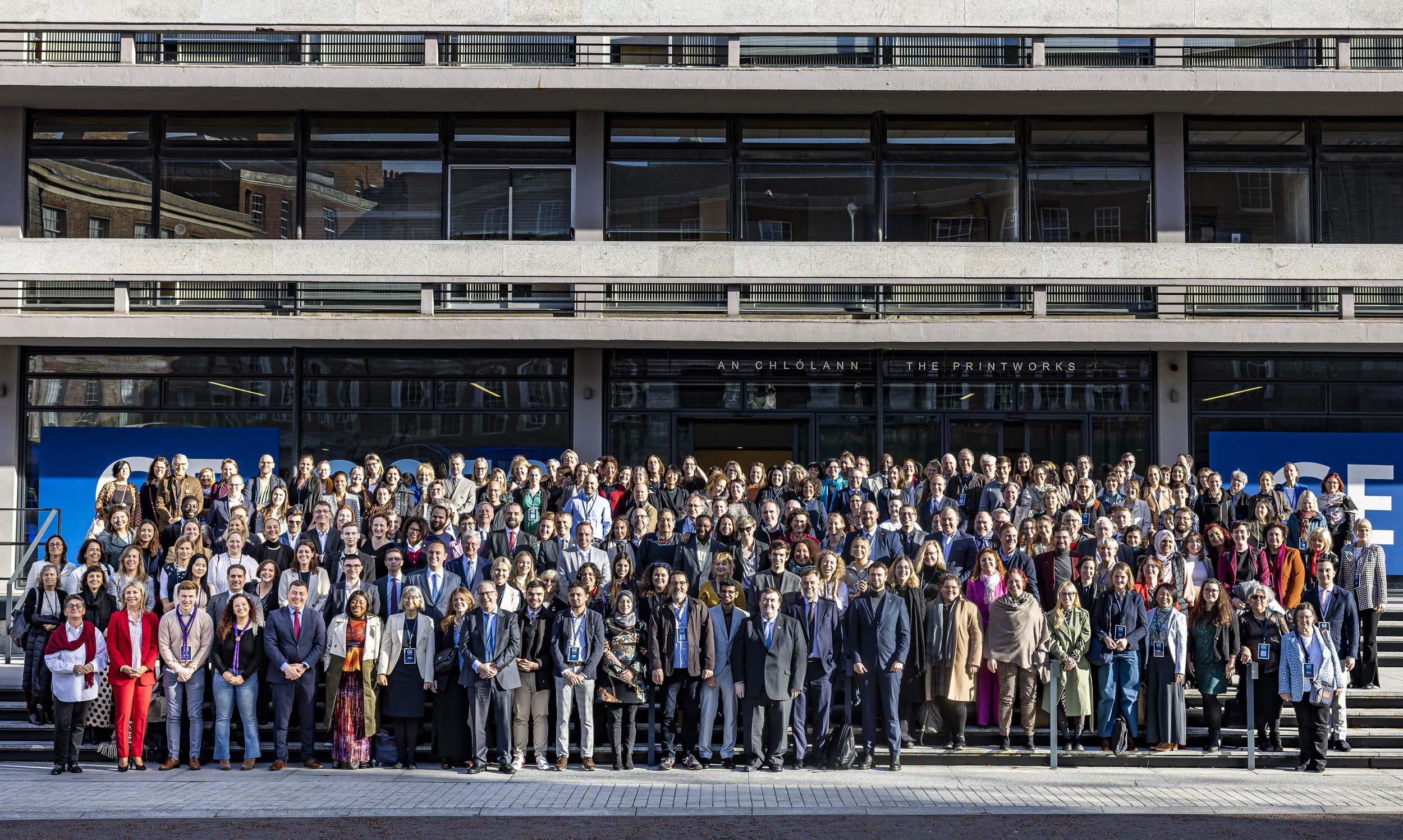
European Declaration on Global Education in Europe to 2050
Adopted at the Dublin Congress on 3-4 November 2022 | Dublin Castle, Ireland
The declaration was drafted in consultation with Ministries and Agencies, of Foreign Affairs and Education, from across Europe, with youth organisations, civil society organisations, local governments and international organisations, along with researchers in the field, as well as global critical friends from Africa, Asia-Pacific and the Americas, to ensure a strong and visionary document.
The Dublin Congress was hosted by the Government of Ireland, co-chaired by the Government of Luxembourg, and convened by GENE.
The Dublin Congress brought together over 300 participants, including representatives from the ministries and agencies that make up the GENE network, youth organisations, civil society, local and regional governments, academia, international organisations and colleagues from other regions. The Congress ended with the adoption of the new GE2050 Declaration, making commitments regarding the role of education in contributing to international solidarity, human rights, global social justice, sustainability and peace.
Recent Publications
The evolution of Global Education in Europe chronicled in the newly released book "Global Education in Europe: National Histories".
While research in Global Education has been flourishing in recent years, including through networks like ANGEL - the Academic Network on Global Education & Learning, publications such as the database GEL - Global Education and Learning and the GENE-EERA partnership, there is little research on the history of Global Education at national level in European countries.
This book marks a significant contribution to the importance of history in this field, while positioning Global Education at the forefront of discussions on education policy and provision, international cooperation and solidarity, and foreign policy.
Since its inception, GENE has focused on fostering progress and policy learning across borders. Policy learning can only happen if we refuse to pretend that our current configurations are the only possible configurations; and learn from past experiences along with current comparative policy and practice.
Quality and Good Practice in Global Education across Europe
This publication presents GENE’s Global Education Award 2020/21, focused on quality and good practice in Global Education across Europe.
READ THE PUBLICATION
Quality and Impact in Global Education
What can be considered as “impact” in Global Education and how this impact can be analysed? Both questions are dealt with within the scope of the research project.
READ THE PUBLICATION
Policy Learning in Global Education
This paper arises from a peer exchange between policymakers with responsibilities in Global Education in Slovakia and Portugal, facilitated by GENE.
READ THE PUBLICATION
Global Education and Climate Change
A policy briefing that addresses the question of how Global Education can contribute to the discourses and practices around education for climate change.
READ THE PUBLICATION
Recent Articles
Education, democracy and global solidarity:
learning to understand the other
In November 2016, thanks to colleagues from the Ministry of Foreign Affairs, France, Edgar Morin honoured GENE by his presence in addressing and giving the keynote closing lecture to the GENE Paris Conference. To celebrate his 100th birthday, GENE published his keynote speech. Morin reminds us of the crucial centrality of history, memory, understanding what it means to be human and solidarity. In his address, he summed it up simply: the current education system is obsolete. The response: recognising the growing complexity, we need to put global solidarity at the heart of education in an age of uncertainty.
Global Education: What Education Systems Need in a Time of Crises
Education that helps open people’s eyes and encourages them to act in solidarity with others is not something new. Indeed, as long as people have thought about learning; there has been a question at the heart of the conversation: how to ensure that people learn not just how to fit into the way things are, but also learn how to change things. Given the current political context in Europe and globally – the challenges to democracy, the rule of law, multilateralism, human rights, solidarity, justice and truth; and given the ongoing pandemic - this kind of education (that is: Global Education) is just what the world needs, and what education systems need, right now.
Webinars
Listen for free a series of webinars (in German) on different topics related to evidence-based global learning. Access the webinars here.
“The challenges of the 21st century - be it pandemics or climate change or other issues of justice, local and global - can only be responded to together and in cooperation. That is why multilateral cooperation is so important, and why as GENE we work together at a European level to increase and improve Global Education for all.”
– Prof. Annette Scheunpflug, GENE Chair
This website was created and maintained with the financial support of the European Union and the Ministries and Agencies that support GENE. Its contents are the sole responsibility of GENE and do not necessarily reflect the views of the European Union.
